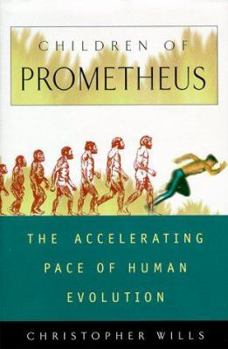Children of Prometheus: The Accelerating Pace of Human Evolution
Select Format
Select Condition 
Book Overview
Are we still evolving? Scientists have grappled with this question since the time of Darwin. Now, in this provocative book, biologist Christopher Wills argues that we are not only continuing to evolve... This description may be from another edition of this product.
Format:Hardcover
Language:English
ISBN:0738200034
ISBN13:9780738200033
Release Date:October 1998
Publisher:Basic Books (AZ)
Length:310 Pages
Weight:1.35 lbs.
Dimensions:1.2" x 6.5" x 9.6"
Customer Reviews
1 rating
A complex and rewarding look at the state of human evolution
Published by Thriftbooks.com User , 24 years ago
Christopher Wills puts to rest a common belief that humans, having mastered their environment, have brought their own evolution to a standstill, now exempted from the pressures of natural selection. Humans, through their manipulation of the environment both deliberate and unintended, have actually increased the pace of evolution, both their own and that of other animals. Wills brings the professional knowledge of population genetics to this subject to write a popular science book which will challenge the reader far more than many other popular science books.He fills the beginning of the book with many insightful examples which hold the attention and educate the reader. Where we encounter more familiar examples, Wills takes the subject several steps deeper in a way which will keep more veteran science readers interested in addition to illuminating Wills' thesis. For example, with the malaria/sickle cell anemia phenomenon, he goes on to show many other patterns of balanced polymorphism and also elaborates on the role that the appearance of human agriculture has played in causing this phenomenon in the first place. His example of the Tibetans evolutionary adaptation to their environment truly fascinated me.In the next part, he presents a thorough evolutionary account of the emergence of humans from Australopithecus, including useful comparisons with our great ape relatives and some special focus on our recently extinct closest relative, Neandertal. Far more than just a summary of human evolution 101, this section of the book demands the most attention out of the reader. In addition to providing the outline for human evolution, Wills takes the opportunity to introduce the reader to many in depth concepts of population genetics which play crucially into his thesis. Don't feel frustrated if you find yourself needing to reread chapters in this section, where the first part may have breezed by for you. You will miss a lot of Wills' thesis if you drop out at this point. I found the graphics in this section crucial to helping me understand, and I only wish the author and/or publisher had provided more.Finally the last part presents the final unfolding of Wills' thesis bringing careful attention to the ongoing evolution of human mental capacities, in addition to a keen focus on cultural factors at work. Wills introduces the idea of "culturgen," E.O. Wilson's less popular competing synonym of Richard Dawkins' "meme" in describing interplay between culture and biology. This choice of terms proves apt, however, in that Wills' evolutionary thesis proves far more complex than the conceptual elegance of Dawkins' selfish gene theory. Wills concentrates far more on population genetics rather than the individual gene. His interest here lies in the unexpressed genetic potential of an individual, in addition to the extended phenotype of expressed genes. He focusses far more on the population, environmental, cultura




